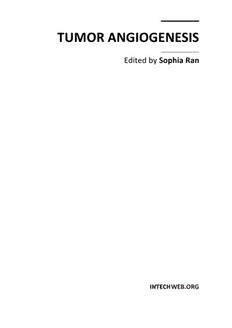
Tumor Angiogenesis PDF
Preview Tumor Angiogenesis
TUMOR ANGIOGENESIS Edited by Sophia Ran Tumor Angiogenesis Edited by Sophia Ran Published by InTech Janeza Trdine 9, 51000 Rijeka, Croatia Copyright © 2012 InTech All chapters are Open Access distributed under the Creative Commons Attribution 3.0 license, which allows users to download, copy and build upon published articles even for commercial purposes, as long as the author and publisher are properly credited, which ensures maximum dissemination and a wider impact of our publications. After this work has been published by InTech, authors have the right to republish it, in whole or part, in any publication of which they are the author, and to make other personal use of the work. Any republication, referencing or personal use of the work must explicitly identify the original source. As for readers, this license allows users to download, copy and build upon published chapters even for commercial purposes, as long as the author and publisher are properly credited, which ensures maximum dissemination and a wider impact of our publications. Notice Statements and opinions expressed in the chapters are these of the individual contributors and not necessarily those of the editors or publisher. No responsibility is accepted for the accuracy of information contained in the published chapters. The publisher assumes no responsibility for any damage or injury to persons or property arising out of the use of any materials, instructions, methods or ideas contained in the book. Publishing Process Manager Molly Kaliman Technical Editor Teodora Smiljanic Cover Designer InTech Design Team First published February, 2012 Printed in Croatia A free online edition of this book is available at www.intechopen.com Additional hard copies can be obtained from [email protected] Tumor Angiogenesis, Edited by Sophia Ran p. cm. ISBN 978-953-51-0009-6 Contents Preface IX Chapter 1 Heparin-Like Drugs with Antiangiogenic Activity 1 María Rosa Aguilar, Luis García-Fernández, Raquel Palao-Suay and Julio San Román Chapter 2 Regulation of Angiogenesis in Human Cancer via Vascular Endothelial Growth Factor Receptor-2 (VEGFR-2) 27 Shanchun Guo, Laronna S. Colbert, Tanisha Z. McGlothen and Ruben R. Gonzalez-Perez Chapter 3 The Effect of Chinese Herb on Tumor Angiogenesis by Inhibiting Vessel Endothelial Cells 67 Jian Jin, Li-Ying Qiu, Hui Hua and Lei Feng Chapter 4 Beyond VEGF: The NOTCH and ALK1 Signaling Pathways as Tumor Angiogenesis Targets 85 Olivier Nolan-Stevaux and H. Toni Jun Chapter 5 Platelet Regulation of Angiogenesis, Tumor Growth and Metastasis 115 Jessica Cedervall and Anna-Karin Olsson Chapter 6 Malignant Transformation in Skin is Associated with the Loss of T-Cadherin Expression in Human Keratinocytes and Heterogeneity in T-Cadherin Expression in Tumor Vasculature 135 Kseniya Rubina, Veronika Sysoeva, Ekaterina Semina, Natalia Kalinina, Ekaterina Yurlova, Albina Khlebnikova and Vladimir Molochkov Chapter 7 Modeling Tumor Angiogenesis in Zebrafish 167 Massimo M. Santoro Chapter 8 The Role of VEGF in the Process of Neovasculogenesis 181 Aleksandra Sobczyńska-Rak VI Contents Chapter 9 Cancer Related Inflammation and Tumor Angiogenesis 197 Ping Wu Chapter 10 Infantile Hemangiomas: A Disease Model in the Study of Vascular Development, Aberrant Vasculogenesis and Angiogenesis 213 Alvin Wong and June K. Wu Chapter 11 MicroRNAs Regulation of Tumor Angiogenesis 231 Munekazu Yamakuchi Chapter 12 New Molecular Targets for Anti-Angiogenic Therapeutic Strategies 249 Amanda G. Linkous and Eugenia M. Yazlovitskaya Chapter 13 Molecular Mechanisms of Tumor Angiogenesis 275 Kelly Burrell and Gelareh Zadeh Preface Angiogenesis is the main process responsible for formation of new tumor blood that play an essential role in expansion of the tumor mass and dissemination of metastatic cells. Tumor angiogenesis significantly differs from the tightly controlled normal neovascularization driven by physiological needs. This is because the tumor environment contains excessive levels of vascular endothelial growth factor-A (VEGF-A) as well as many other pro-angiogenic factors that are produced by neoplastic, stromal, and infiltrating immune cells. This imbalance of pro-angiogenic versus anti-angiogenic factors promotes generation of numerous but abnormal blood vessels that exhibit severe structural and functional defects. The chaotic and poorly-perfused tumor vascular network creates a chronically inflamed site that promotes thrombosis, and impedes drug delivery, causing further complications to the cancer patient. Most importantly, the structural and functional abnormalities of tumor vessels promote hematogenous metastasis, which is the main cause for decreased survival of patients with solid tumors. It is, therefore, not surprising that tumor angiogenesis is regarded as an important target for developing anti-cancer strategies with many studies focused on mechanisms of the tumor blood vessel formation and their impact on tumor pathology and progression. This book covers a variety of topics related to the biology of tumor vasculature. This includes reviews on VEGF-A-dependent and independent mechanisms controlling the formation of new vessels; contribution of inflammatory cells and platelets to tumor neovascularization; identification of new molecular targets for inhibition of tumor angiogenesis; and potential clinical use of novel anti-angiogenic therapies based on heparin-like compounds and Chinese herbal extracts. The book covers also two emerging subjects in the field: a recently developed zebrafish model of tumor angiogenesis, and microRNA regulation of blood vessel formation at the tumor site. Collectively, the chapters in the book provide a current update on central findings in the tumor angiogenesis field, while highlighting potential targets for inhibition. We hope that this book will be useful for oncologists, cancer basic researchers, and biologists with interests in vascular and endothelial cell behavior in the context of cancer. Sophia Ran, Ph.D. Associate Professor Southern Illinois University, School of Medicine Springfield, IL USA
